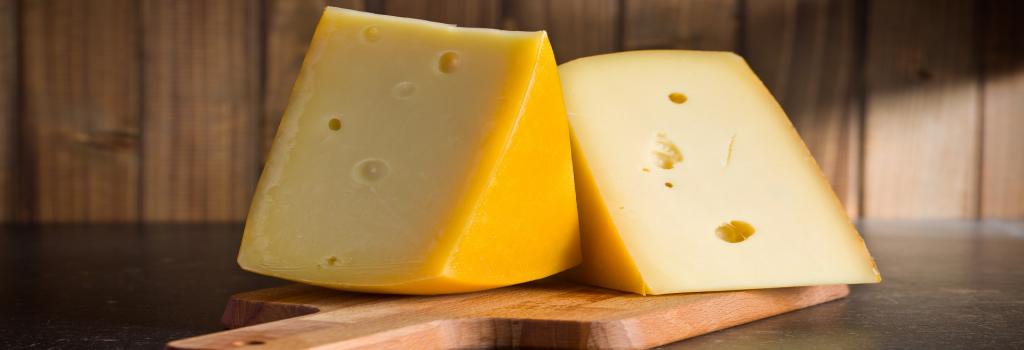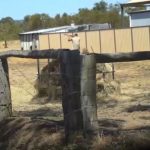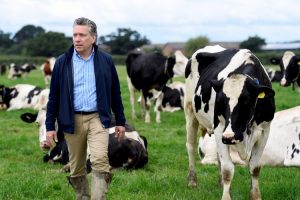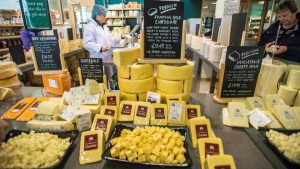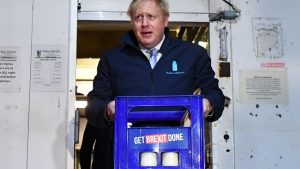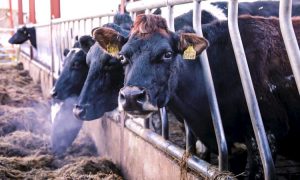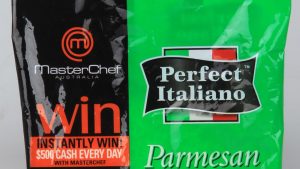
“There are 23 farms within a 30-mile radius of us, but most of them couldn’t supply us because their contracts with the big dairies wouldn’t allow it, or the milk quality wasn’t good enough for making cheese,” he explains.
Eventually he discovered a local herd of Jersey cows – whose creamy milk he now turns into Floyd, a fragrant, washed-rind cheese – but the difficulties of finding the seemingly ubiquitous ingredient continued to play on his mind.
The situation has become even harder since Gimblett Cheese was first established, with dairy farms closing down at a rate of one every other day, for reasons including low milk prices. Meanwhile, the impact of Brexit looms over the industry, with worries about consumer confidence and rising costs.
Gimblett became so concerned about the challenges facing Britain’s artisan cheesemakers that he decided to investigate them for himself. Just before Christmas, the 50-year-old set off in his Land Rover to visit 100 British cheesemakers in 100 days. “My original idea was to find out if there’s a future for British cheese post-Brexit, but this voyage has become so much more than that,” he says. “It’s a chance to meet with the makers, discover cheese gems and find out what is holding the industry back.”
The grand tour, which takes in cheddar makers in Somerset, stilton specialists in Nottinghamshire and new cheesemakers everywhere from Sussex and Northumberland to Wales and Scotland, is due to finish in Northern Ireland on March 30 – the day after Brexit. Gimblett has been camping along the way in a pop-up tent on the roof of his car.
“The tent is surprisingly comfortable and I make fresh coffee every morning with a grinder that plugs into the car,” explains the curly-haired cheese explorer when I joined him at Kingcott Dairy near Tunbridge Wells.
The Kent dairy farm and cheese business, which has a 100-strong herd of milkers, is stop 17 on Gimblett’s route. Owners Steve and Karen Reynolds started making raw-milk Kentish Blue in 2007 (pictured right) to add value to their milk after becoming disillusioned by rock-bottom prices. “We were getting knocked left, right and centre and decided we had to do something. We looked at yogurt but cheese gave us a better return,” says Steve Reynolds.
Dairy farmers all over the country have moved to insulate themselves from low milk prices by diversifying into dairy products, fuelling an artisan cheese renaissance. “The quality of British cheese is exceptional,” says Gimblett. “It can be as good as anything in France or Italy. But I’m worried that people think artisan cheese is in a strong position, when it actually faces a lot of challenges.”
Gimblett’s research shows there are only 350 artisan cheesemakers in the UK, compared with 4,500 in France. To reach those sorts of numbers here, the big retailers need to stock more British cheese, he says. “It’s madness that there seems to be more imported artisan cheese on our supermarket shelves than British. Imagine a French supermarket stocking no local cheese and instead promoting stilton, caerphilly and cheddar.”
Cheesemakers also need better access to quality milk, says Reynolds, who explains that the contracts imposed by big milk processors mean that farms are often prevented from supplying cheesemakers, and even face tough restrictions on how much of their own milk they can use to make cheese.
Kingcott supplies milk to Southampton-based Pensworth dairy, which, unlike other processors, is happy for the farm to make cheese. About 20 per cent of Kingcott’s milk is used to make 220kg of the fruity Kentish Blue per week, which retails for about £25 per kg, providing a much healthier margin than the 28p-a-litre average paid for milk.
Cheesemaking requires milk that is rich in protein and butterfat, explains Reynolds, so the farm is slowly replacing its high-volume, black-and-white Holstein cows with imported Swedish and Danish cows. Known as Viking Reds, the compact, sweet-natured animals I am introduced to outside produce 10 per cent less milk than the Holsteins and cost more to buy. But their milk is much higher in solids, which means a 25 per cent increase in cheese yields. The animals also live longer.
“The milk gives the cheese a sweeter, more complex flavour,” Reynolds says. “There’s a big drive in this country towards bigger herds. People think the more milk they produce, the more money they make, but volume isn’t everything. Quality is a focus for us and it’s paying off.”
It’s an approach often seen across the Channel, says Gimblett, where farms work closely with cheesemakers. “We need something similar here,” he says. “Perhaps a wholesaler specialising in milk for cheesemaking from small family farms. It would be great to be able to choose from a menu of milks from different breeds, depending on what cheese you want to make.”
It’s just an idea, but Brexit could give impetus to British cheese. “Some cheesemakers I’ve visited say there are opportunities with Brexit,” says Gimblett. “There could be increased demand for British cheese after we leave, if products from the EU are more expensive. But you can’t make an excellent cheese without top-quality milk.”
Reynolds couldn’t agree more. “It really all comes down to how you treat these girlies,” he says, affectionately patting one of his prize cows as Gimblett climbs back into his Land Rover and zooms off on the next leg of his cheese odyssey.
Other rare-breed cheeses to try
Single Gloucester, Charles Martell & Son
Must be made in Gloucestershire with partially skimmed milk from Old Gloucester cows – the oldest dairy cow breed in Britain.
Available from La Fromagerie, London (lafromagerie.co.uk)
Baron Bigod, Fen Farm Dairy
Suffolk farmers Jonny and Dulcie Crickmore bought a herd of Montbéliarde cows, whose milk normally makes comté but is now used in this Brie de Meaux-style cheese.
Available from The Cheese Society, Lincoln (thecheese
society.co.uk)
Traditional Ayrshire Dunlop, Dunlop Dairy
Scotland’s answer to cheddar, it dates back to the 1700s and has a moist texture and sweet buttery flavour thanks to the high percentage of butterfat in the milk of Ayrshire cattle.
